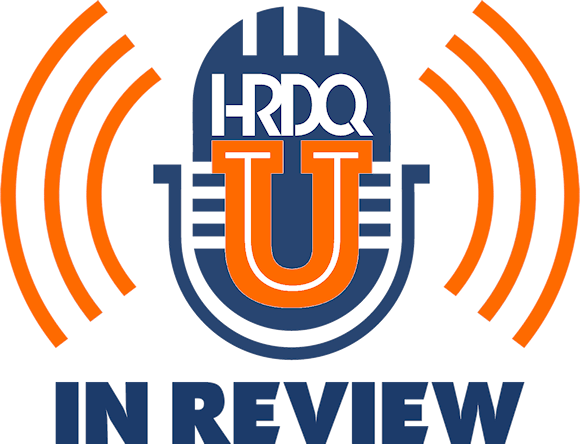
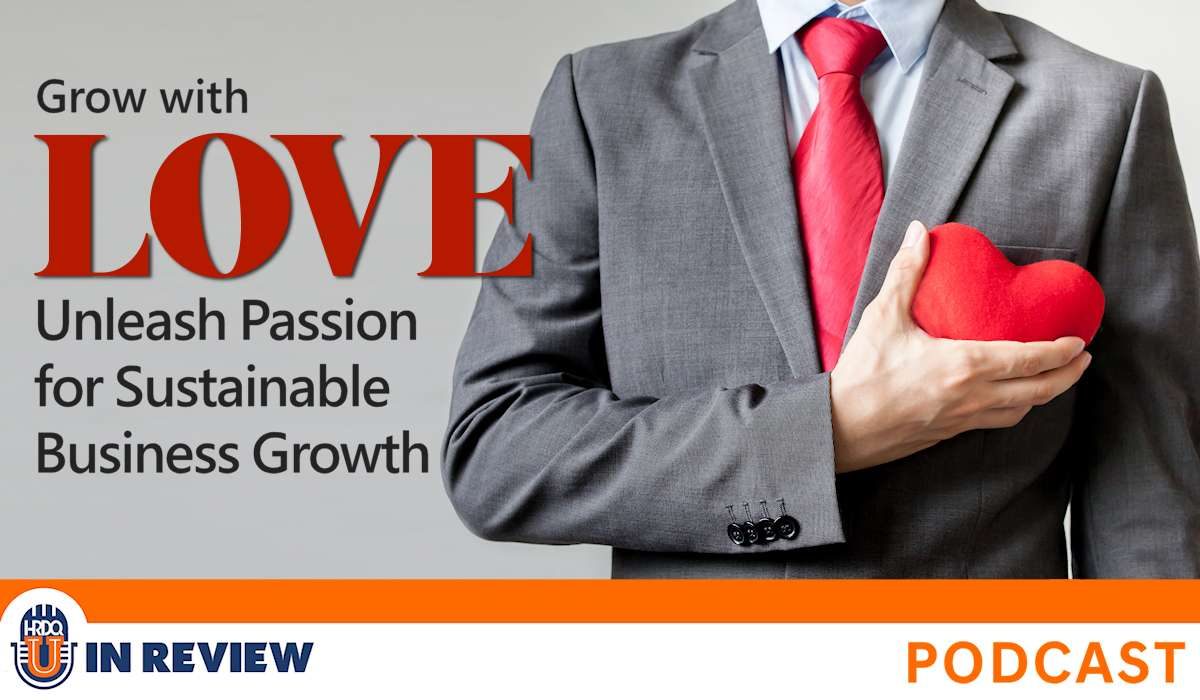
Host Sarah welcomes Steve Farber, a leadership expert with 35 years of experience, to discuss key takeaways from his recent webinar, Grow with Love: Unleash Passion for Sustainable Business Growth.
Steve explores the human side of leadership, emphasizing that passion – what he calls love in business – is one of the most successful business strategies for long-term success. He shares insights on AI’s role in L&D, the return of in-person learning, and the importance of authentic leadership in fostering engagement.
Listeners will hear real-world leadership examples, including an executive’s profound act of emotional intelligence, and gain actionable, successful business strategies to build a passionate, sustainable workplace culture.
Chapters:
⏱ 00:01 – Introduction and Background
Sarah introduces the HRDQ podcast and welcomes Steve Farber, who shares his 35-year journey in leadership development across various industries.
⏱ 02:05 – Current L&D Trends
Steve discusses two major trends: the rise of AI and the return to in-person learning in the post-COVID era, emphasizing the continued importance of human connection.
⏱ 06:08 – Passion and Love in Business
Steve explains how passion, synonymous with love in business, is crucial for creating competitive advantage and sustainable growth through customer and employee experience.
⏱ 13:00 – Leadership and Emotional Intelligence
Steve shares a touching story about an executive’s demonstration of emotional intelligence by flying to Sydney to be with a dying employee, illustrating the impact of authentic leadership.
⏱ 19:49 – Creating Sustainable Culture
Steve discusses how to create a culture that prevents burnout by focusing on hiring people with aligned values and creating an environment that fosters genuine enthusiasm, a key element of successful business strategies.
Action Items:
Tune in now to learn how love and leadership can transform your business!
Resources and Links:
Watch the webinar: Grow with Love: Unleash Passion for Sustainable Business Growth
00:01
Welcome to this week’s episode of the HRDQ-U In Review Podcast where we bring you the latest insights and practical tools for enhancing soft skills training in your organization. This podcast is brought to you by HRDQU.com, and I’m your host, Sarah, Learning Events Manager at HRDQU. Make sure to subscribe to our newsletter at HRDQU.com for exclusive updates, upcoming webinars, and resources to help you and your team excel. Today, we are joined by Steve Farber to discuss the recent webinar he presented, Grow with Love: Unleash
00:30
Passion for Sustainable Business Growth. Steve, thanks so much for joining me today. Thank you, Sarah. Great to be back with you. So Steve, this was the first time you came on. did a webinar with us for those newcomers that are listening in on the podcast here, getting to know you for the first time. Can you share a little bit about yourself and your work? Sure. So I’ve been been at the work of leadership development in some form or another for three and a half decades, which is
00:59
35 years according to my advanced math skills. So I’ve had this very, I’m going to say unique journey in that I’ve been able to spend time with, work with, be around just about every kind of company you could think of in just about every kind of industry. So I’ve got this broad-based perspective as to what really works and what doesn’t. Of course, the flip side to that is I have expertise in none of these industries.
01:27
because it’s so broad-based, except for the one thing that, at least for now, all of them have in common, which is they’re all populated by human beings. So my work has really been focused on that element of business, the people that show up to do the work, and how do we create an environment, a culture, whatever word you want to use, that really brings the best out of people and gives them an experience that they could really feel excited about committing to.
01:57
And from your perspective, Steve, what key trends or changes do you see happening right now in the L &D space? Well, you know, I’m going to say the same thing that everybody should be saying right now, which of course is the the rise of the robot. you know, the implications of AI, of course, are a big deal. Putting that aside for a second, in the post-COVID era that we’re living in,
02:25
I’m seeing more of an appetite for people getting together in person. So on the one hand, we’ve gotten good at and used to utilizing various virtual outlets for learning and development, but nothing will ever take the place of face-to-face. So I think now that people are back into the, we can all sit in the same room and bring the same oxygen.
02:55
We’re seeing more of an appetite for that, like I said. I think AI is going to play an increasingly important role, which sounds so obvious that it’s even ridiculous to put attention on it. But I think it does not run the risk of replacing human beings in the art of training and education and learning.
03:24
After all, a lot of times this falls under the purview of the human resources. And it does have that word human in the title. So I think we’re going to be learning how to use AI as a tool to further enhance our ability to connect human to human.
03:47
Yeah, you know, this is a question that I like to ask all of my guests that come on to the podcast. And that isn’t the first time it has been a more recent common theme where folks are saying, you know, getting people together in person and, you know, seeing that come back, which is great. So, Steve, what exciting projects or initiatives are you currently working on? Well, for me, top of mind is I am this close, as they say, to finishing a new book.
04:18
It will be book number six for me. And it’s that light at the end of the tunnel sort of phase on it. So that’s a big project top of mind. And of course, what falls out from that are all the opportunities to help people to apply the principles of the book, which is really about, it’s a very simple,
04:47
simple kind of challenge on the surface, but very difficult to implement, which is all about the power of one’s own credibility, the necessity for it, and the act simply of doing what you say you will do. So I know that hits a lot of buttons with people because
05:15
We all like to perceive ourselves as being a person who follows through, a person who’s congruent between our words and our actions. But at times it seems that the world conspires against our being able to follow through our words with our actions. So doing what you say you will do on the surface is about, you know, transactional, following through on what I say I’m going to do. But on a deeper level, it’s about really being really clear as to what I say is important.
05:45
the values level of this whole thing, and then making sure that I’m acting in a way that’s congruent with those values. Well, you’ll have to keep us up to speed on that book launch so that we can share that out with the audience. And in your experience, what role does passion play in driving sustainable business growth? And on top of that, are there common misconceptions about passion in business? Yeah, know, passion is an interesting word. To me, passion is
06:15
is a synonym for the word that we tend to avoid as business people, which is love. Passion seems to be, know, we’ve been using that word for a very long time, right? It’s become part of our lexicon. You know, I’m passionate about the work that I do, I’m bringing my passion to my work, which is all good. But really, it’s at the heart, no pun intended, of everything.
06:43
that we try to do as business people. Because, and again, if I could swap out the word passion for the word love, even though we can freely do that, but I think love raises the bar on the equation. Really what this is about is we need to make sure that our customers or clients love what we do for them. Because anything short of that does not give us a competitive advantage. So.
07:11
If we want our customers to love the experience of doing business with us, that means we have to create an environment or culture that people love working in. And I can’t create or contribute to that kind of culture as a leader or even as an individual contributor, unless I love it myself first. So it all becomes very personal very quickly, but it really is at the core of everything that we do. If we put our attention on it and
07:41
cultivate it in the way that we do business. And you recently presented the webinar Grow with Love Unleash Passion for Sustainable Business Growth. Now, if you have yet to check out that webinar, we will have that linked below. So you can go to that page. Make sure you give it a watch. But could you summarize here for us what the key takeaways were for our registrants at this event? Yeah. So the words that I just spoke, I think, kind of frame it up. But then the question becomes
08:09
and this is really the essence of the whole thing, what should love look like in the way that we do business? So it’s not about love as an empty sentiment, certainly. It’s not about love as a soft, ethereal, fluffy kind of a thing. It’s about love as a practice and as a discipline. In other words, it…
08:39
It has an implication for everything that we do from our hiring process to our systems policies and procedures, to the way that we hold meetings, to the way that we treat our customers, to, know, it’s really kind of all the above. So the takeaway from the webinar itself is really about framing up what you’ll walk away with is the right set of questions
09:09
to begin to ask yourself and your business to get you closer to that ideal where everything that we’re doing is creating an experience that people are gonna love being a part of, especially our customers. And many leaders struggle to keep their employees engaged and motivated. What would you say one practical step a leader can take to foster passion in their team? Yeah, there’s, boy, there are so many.
09:38
So many. So a good starting place is to ask yourself this question, how well do I know the people on my team who I’m quote unquote supposed to motivate, supposed to engage? And what I mean by that is oftentimes we get to know people only in the context of work and in the function or functions that they
10:08
serve in the context of business. But if I’m really going to help to unleash their passion and love for it, I need to know who they are. What are their hopes? What are their dreams? What are their aspirations? What are their challenges? What’s going on at home? Not to be overly nosy or personal about it, but do I know enough about them in their lives that I can help them through the way that we work?
10:36
to be more fulfilled in whatever it is that they’re trying to do. And when people get the sense that their leaders, that their colleagues care about them, then the natural response is to be more passionate about the work that we’re doing together. And to start that inquiry where I really want to get to know Sarah, right? I want to know what
11:05
what makes you tick. I want to know what’s going to fulfill your biggest dreams when you come to work. Just engaging in that inquiry about you shows you that I care enough to ask. And then that I care enough to really listen to what you have to say. And then that I care enough to try to facilitate your accomplishing the things that you want to accomplish.
11:35
Again, a really good place to start is to get to know the people around you even better than you do right now. It’s really showing interest in your team and the people that make up your team. Yeah, but a specific way of doing that and the to go just a little bit deeper on it. Ask yourself this. How much do I know about?
12:04
the stories of the people that I work with. Do I know their stories? Do I know their, you know, what do we like to call it in fiction, their origin story, right? Do I know anything about the experiences that they’ve had where they’ve learned the lessons that they’ve learned and come to value the things that they value? So do a little story inventory. So what you could literally do is write down the names of the people on your team, you know, pick five or six of them, and just
12:34
Take some notes. Do I know this person? What story do I know about this person? What story do I know about Sarah? What story do I know about George? And what you’re going to find is that you may not know as much as you think you do. And let’s take a second here to talk about the connection between emotional intelligence and business success. Could you share an example of how a leader’s emotional intelligence impacted business growth? Sure.
13:03
Obviously this is all about emotional intelligence. And I remember when Daniel Goldman wrote a book about EQ back in the 90s. He didn’t invent the term emotional quotient, but he was one of the first really popular authors to write about it. And it became all the rage, know, back in the day, back in the 90s. And I think it’s become again, more accepted that we understand
13:33
the value that emotional intelligence plays. Intellectual capability, analytical skills, all that are all super important as well. So what does that look like? How can that show up? Again, there’s thousands of ways to do it, but I’ll give you one specific example. One of the executives that I’ve worked with quite a bit over the last year or so runs an organization.
14:01
international in its scope. He goes back and forth between Australia and the US. And somebody on his team in Australia, who was not particularly a popular guy at work, did great work, did very high quality work, but had some issues socially, I guess you would say, became very ill.
14:31
and ended up in the hospital. And he was there by himself. He had no family. Apparently he have any friends. And my executive buddy obviously heard that he was in the hospital in Sydney. And this guy was in the U S he got on a flew to Sydney.
15:00
went to the hospital and sat next to this person literally in the final hours of his life. Wow. Now, what did that do for this unfortunate person who was passing away? I’m sure it gave him a lot of comfort in that moment. But beyond that, the fact that he did that was not
15:30
unknown to everybody else, word got out that he got on a plane to sit in the same room as this person as he was passing away. What message do you think that sends to everybody else on the team? Now, obviously he didn’t promote it like that. He didn’t say, hey, look what I’m doing. Look how benevolent a leader I am. He didn’t do that. He did it because it was the right thing to do. But I think one of the things that we lose sight of
16:01
is particularly people in leadership roles, although I think it’s true for all of us, is that people watch everything that we do. They watch everything that we do. And they extract meaning from what we do. And if I go out of my way to show that level of love and care for somebody, that’s a demonstration of emotional intelligence. And it…
16:27
It basically says to everybody through my actions, not necessarily through my words, that this is the kind of support that we should give each other. Yeah, absolutely. Well, that was a beautifully sad story that you just shared there, So if someone wanted to start cultivating more passion and purpose in their work today, what’s one simple habit that they could implement?
16:53
Yeah, starts with first of all, affirming for ourselves that this is what we want. See, one of the things that I’ve learned is that I am not in the business of convincing anybody of anything. It’s not my job to convince you that this love thing is a good idea. My job.
17:22
is to confirm the instinct that you already have. So it’s really about…
17:35
Being aware starts with awareness. So if you’re listening to this and you’re thinking, this love thing is crap, then thanks for tuning in. On the other hand, and we’ll see you later. On the other hand, if you’re listening to this and going, yeah, well, I’ve always thought that. I’ve always felt that. didn’t think I was supposed to. I didn’t think this was something that was appropriate for work. And now you’re listening to this and you’re thinking, oh yeah, okay.
18:03
I need to do more of what I already knew, but haven’t acted on. So the best place to start is in reflection. So to ask yourself, and this is one of the questions I pose on the webinar, why do I love this? Why do I love this work? And ask yourself that question frequently. And if you have trouble with that, so if you’re thinking, why do I love this work? And the real answer is,
18:35
I don’t. That’s good to know. So then reframe the question a little bit. What about this work do I love? Is there something about this that I really am passionate about, that I really do get excited about? So start with asking yourself that question and try it every day. And the worst day that you’re having, that’s the best time.
19:04
to ask yourself that question. See if you can remind yourself, right? Because there are some days you ask that question and say, why do I love this work? Why do I love this team? And you know, let me count the ways and you can write a love sonnet to everybody. But then there are other days where it’s not quite so clear, right? It’s like, I don’t know why the hell I even got out of bed this morning. That’s the time to really ask yourself the question and then see where that takes you. So why do I love this work? And part two of that question is, how do I show it? How do I show it better?
19:34
to the people I work with and the people that I work for, otherwise known as customers, et cetera. Now, how can organizations create a culture that encourages both this passion and long-term sustainability without needing to burn out?
19:49
Yeah, well, we always run the risk of burnout when we’re doing something that we dislike too much. That’s the worst risk of burnout. So if you take the flip side of that question, if you want to create burnout in people, let’s start by making them work longer hours under terrible conditions.
20:17
for stuff that they really hate doing. That’s the fastest way to burn somebody out. So they asked the question, how do we generate a culture with more passion without burning out? Well, that’s part of the solution to not burning out. The more excited I am about the work that we’re doing, the less chance there is I’m gonna fry in the process of doing it. But to apply this on an organizational level means taking that same kind of question, that same filter, which is what should love look like?
20:47
And as I said earlier, applying it to everything. So, you know, it can start with the kinds of people that we hire. Are we hiring people who have values that are congruent with the values of the organization? Are we hiring people that have real passion and expertise about the kind of stuff that we do and the stuff that we offer? And then it’s, we creating an environment that people…
21:15
you know, look forward to going to work to every day. And by that, mean, from the physical environment, if we happen to be under the same roof, to the environment of the tenor and tone and structure of our meetings, to the way we run projects, to it’s all of that. It’s putting every aspect of our business through that filter of is this contributing to
21:45
the increase of passion. In other words, is this contributing to people’s feeling emotionally invested in and excited about the work that we’re doing? And Steve, before we wrap up today, where can listeners go to learn more about your leaders work and connect with you? Well, thank you. Stevefarber.com is one place to go. Got a lot of resources there, videos and downloads and all that.
22:12
And you can also check me out on LinkedIn. I’m putting a lot of content up on LinkedIn lately. And then if you want to dive into one of my books, my kind of cornerstone book, it’s called The Radical Leap. If you go to radicalleap.org, you can download a free copy of the Leap audiobook. And I’m making that available there for a limited time. So go check that out.
22:42
And if you Google my name, you’ll find me. I’m pretty easy to find. Well, thank you, Steve, for your time today and for sharing some more on this topic. Thank you, Sarah. It’s been my pleasure. And we hope you enjoy listening to the HRDQ-U In Review podcast, available on all major streaming platforms. If you did enjoy today’s episode, make sure to give us a follow and leave us a five star review. Thank you all for tuning into this week’s episode of the HRDQ-U In Review podcast brought to you by HRDQU.com.

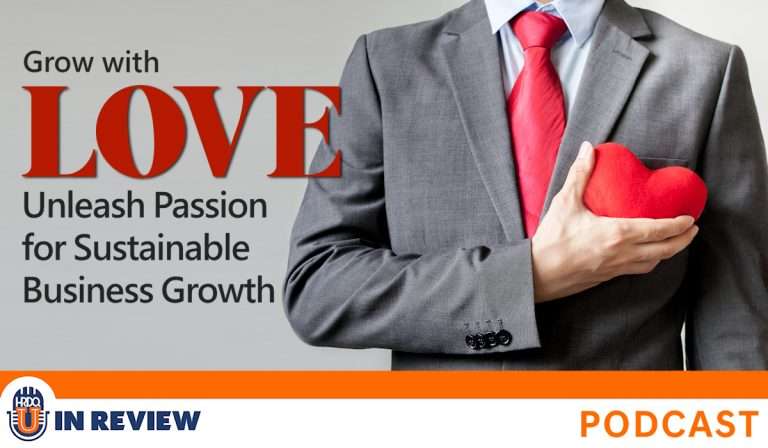
Listen to this podcast event at no charge with your
HRDQ-U Free Access Membership
Host Sarah welcomes Steve Farber, a leadership expert with 35 years of experience, to discuss key takeaways from his recent webinar, Grow with Love: Unleash Passion for Sustainable Business Growth.
Steve explores the human side of leadership, emphasizing that passion – what he calls love in business – is one of the most successful business strategies for long-term success. He shares insights on AI’s role in L&D, the return of in-person learning, and the importance of authentic leadership in fostering engagement.
Listeners will hear real-world leadership examples, including an executive’s profound act of emotional intelligence, and gain actionable, successful business strategies to build a passionate, sustainable workplace culture.
Chapters:
⏱ 00:01 – Introduction and Background
Sarah introduces the HRDQ podcast and welcomes Steve Farber, who shares his 35-year journey in leadership development across various industries.
⏱ 02:05 – Current L&D Trends
Steve discusses two major trends: the rise of AI and the return to in-person learning in the post-COVID era, emphasizing the continued importance of human connection.
⏱ 06:08 – Passion and Love in Business
Steve explains how passion, synonymous with love in business, is crucial for creating competitive advantage and sustainable growth through customer and employee experience.
⏱ 13:00 – Leadership and Emotional Intelligence
Steve shares a touching story about an executive’s demonstration of emotional intelligence by flying to Sydney to be with a dying employee, illustrating the impact of authentic leadership.
⏱ 19:49 – Creating Sustainable Culture
Steve discusses how to create a culture that prevents burnout by focusing on hiring people with aligned values and creating an environment that fosters genuine enthusiasm, a key element of successful business strategies.
Action Items:
Tune in now to learn how love and leadership can transform your business!
Resources and Links:
Watch the webinar: Grow with Love: Unleash Passion for Sustainable Business Growth
[ PODCAST PLAYBACK ]
You must be signed-in with your membership account to access this content.
Enjoyed this podcast? Have suggestions on how we can improve? Please take our quick survey and receive a coupon for 15% OFF any of our individual membership plans.
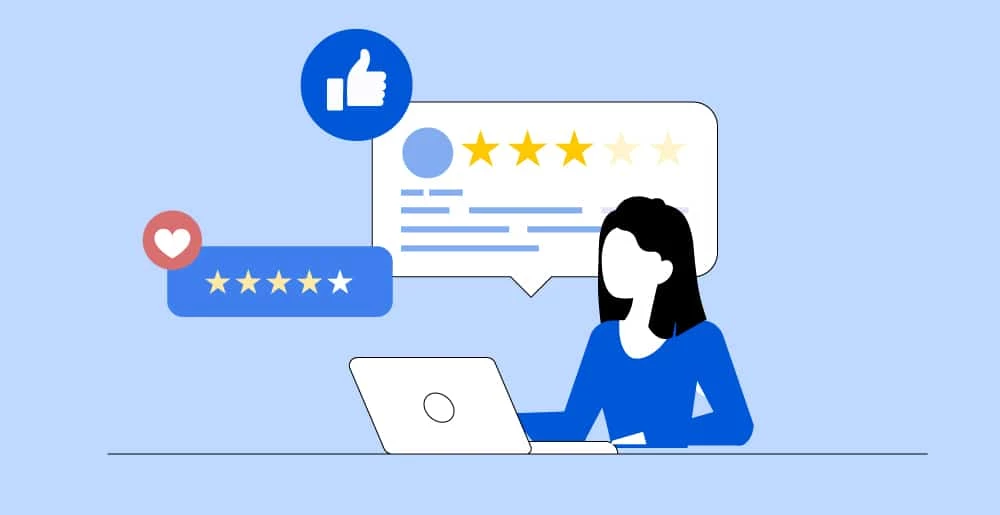
*Instant 15% coupon available upon completion of survey.
Want to learn more? Become an Individual or Corporate member to watch this and hundreds more webinars!
Achieve sustainable business growth with love. Learn how to drive profitability while making a positive impact on the environment and society.

Steve Farber
Steve Farber is a bestselling author, popular keynote speaker, and a seasoned leadership coach and consultant who has worked with a vast array of public and private organizations in virtually every arena.
He is the former Vice President of legendary management guru Tom Peters’ company and is the founder and CEO of The Extreme Leadership Institute – an organization devoted to helping its clients develop award-winning cultures and achieve radical results. The Institute’s team has helped over 25 companies earn a ranking on the Best Places to Work list.
Farber’s third book, Greater Than Yourself, debuted as a Wall Street Journal and USA Today bestseller. His second book, The Radical Edge, was hailed as “a playbook for harnessing the power of the human spirit.” His first book, The Radical Leap: A Personal Lesson in Extreme Leadership, earned Fast Company Magazine’s Readers Choice Award and was named one of the 100 Best Business Books of All Time.
His fourth book, Love Is Just Damn Good Business, has been featured on Wharton radio and The World Economic Forum and was listed by Book Authority as a top business strategy book.
He also co-wrote Twisted Business: Lessons from My Life in Rock and Roll, with Jay Jay French, founder, manager, and guitarist of the iconic rock band, Twisted Sister.
Farber is a member of the exclusive Transformational Leadership Council, and he serves on the board of the Community Alliance for Youth Success, a non-profit organization co-founded by Oprah Winfrey’s life partner, Stedman Graham.
Learn more at stevefarber.com

Founded by leadership pioneer and best-selling author Steve Farber, The Extreme Leadership Institute helps organizations realize their potential by using radical culture transformation tactics rooted in passion, support, and most importantly – love. We help bright professionals grow into more productive, enthusiastic, and insightful leaders. The result? Increased engagement that transforms company cultures and supercharges profitability.
Training Tools for Developing Great People Skills
This event is sponsored by HRDQ. For 45 years HRDQ has provided research-based, off-the-shelf soft-skills training resources for classroom, virtual, and online training. From assessments and workshops to experiential hands-on games, HRDQ helps organizations improve performance, increase job satisfaction, and more.
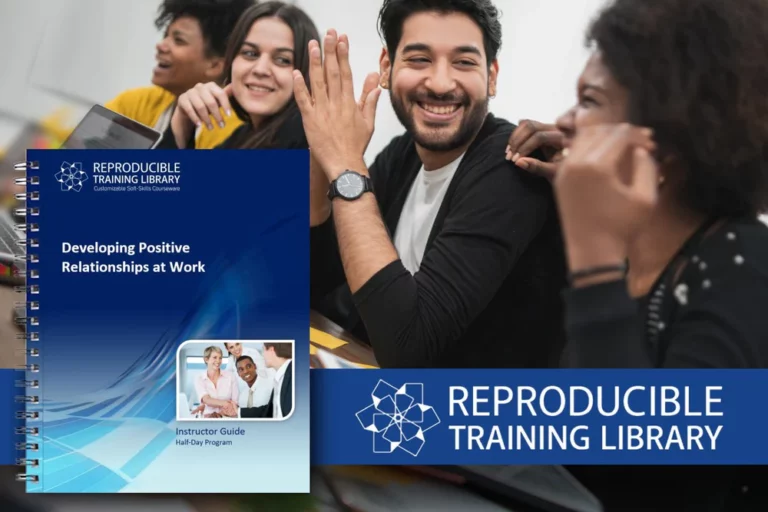
Developing Positive Relationships at Work Customizable Courseware
Discover strategies to foster trust within teams, celebrate diversity, and cultivate a collaborative atmosphere where every individual feels appreciated. By enhancing relationships and recognizing accomplishments, your organization can improve productivity, employee retention, and overall job satisfaction.
Buy at HRDQstore.com
The Happiness Factory
This innovative program guides participants through a metaphorical factory, revealing strategies to enhance engagement at each “station,” ranging from the factory floor to the executive suite. By cultivating an environment that promotes commitment and satisfaction, your organization can achieve greater performance, elevate morale, and realize tangible financial success.
Buy at HRDQstore.com
“Great speaker! Great examples given to help us understand his point of view.”
Bonita G.
Technical Training Manager

“I’m so excited to hear someone put into words what I’ve thought all along…You must love what you do to be successful. When you do, people recognize it. Giving of yourself and loving what you do makes all the difference! I love coming to work and I love being authentic in my approach to all I do. Thank you! This was a very enlightening and informative webinar.”
Lenore M.
Administrative Assistant

“This was great content and incredibly valuable learning, while also validating some of the work I already do in this way! I love it! Thank you.”
Nickie C.
Director of Outreach
The HRDQ-U In Review Podcast, brought to you by HRDQU.com, brings you the latest insights and practical tools for enhancing soft-skills training in your organization. As a learning community for trainers, coaches, consultants, managers, and anyone passionate about performance improvement, we interview subject matter experts and thought leaders from recent webinars they presented with us to take a deeper dive into the content they shared and answer all your questions. Join us as we explore new ideas and industry trends, share success stories, and discuss challenges faced by professionals.
The HRDQ-U In Review Podcast is intended for HR and training professionals, organizational development practitioners, and anyone interested in improving workplace performance and productivity.
New episodes of HRDQ-U In Review are released every week.
The length of the episodes varies, but they typically range from 15-30 minutes.
The podcast covers a wide range of topics related to HR and organizational development, including leadership development, team building, communication skills, conflict resolution, employee engagement, and more.
No, HRDQ-U In Review is completely free to listen to.
You can listen to any available HRDQ-U In Review Podcast right on our website at HRDQU.com via our embedded Spotify player on the related webinar page. In addition to our self-hosted option, you can find the HRDQ-U In Review Podcast on many of the popular streaming services, which are listed above.
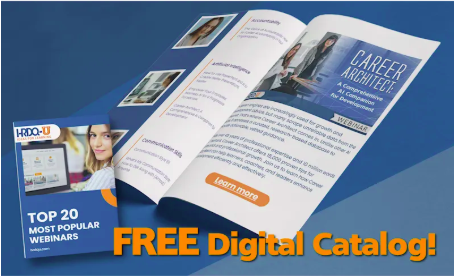
Download our catalog of our top 20 most popular webinars.